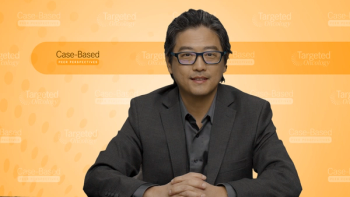
Dosing of Efineptakin Alfa/Atezolizumab Begins in Study of Patients With Advanced Skin Cancer
A patient with a high-risk skin cancer has been administered an investigational interleukin 7 agent, efineptakin alfa, plus atezolizumab, initiating treatment in a phase 2a study.
The first patient with an advanced skin cancer was enrolled in part 2a of a phase 1b/2a clinical trial has been dosed with efineptakin alfa (NT-17), an investigational long-acting human interleukin-7 (IL-7) used in combination with atezolizumab (Tecentriq), according to an announcement by NeoImmuneTech, Inc.1
The IL-7 agent aids in T-cell amplification and enhanced functionality, and therefore may provide clinical benefit across various solid tumors. In previous clinical trials, the pharmacokinetics and pharmacodynamics of efineptakin alfa were favorable and appeared safe for administration as monotherapy and in combination with other anticancer therapies. In addition to solid tumors, efforts are underway to investigate the drug in patients with hematologic malignancies.
“We are excited to move into the Phase 2 portion of this important clinical trial, now that the safety and tolerability of the combination has been demonstrated," said Se Hwan Yang, PhD, president and chief executive officer of NeoImmuneTech, Inc, in a press release.
In the phase 1b/2a, open-label study (NCT03901573) is evaluating the anti-tumor efficacy and safety of efineptakin alfa plus atezolizumab in patients with anti-PD-L1/PD-L1-naive or relapsed/refractory, high-risk skin cancers including cutaneous squamous cell carcinoma (cSCC), Merkel cell carcinoma (MCC), and melanoma. The primary end point of the study is safety and tolerability, and the secondary end point include immunogenicity, preliminary objective response rate, disease control rat, duration of objective response progression-free survival, and overall survival.2
The study aims to enroll up to 84 patients who meet the eligibility requirements to undergo treatment with the investigational combination across centers in California, Illinois, Massachusetts, Missouri, New York, Ohio, and Oregon. To be included, patients are required to be at least 18 years of age with an ECOG performance status of ≤ 2 of a Karnofsky performance score of ≥ 60%. In addition, all patients must have adequate organ and marrow function.
Patients enrolling to the cSCC arm (arm 1) are required to biopsy or locoregional proven disease that has recurred following standard locoregional therapy with surgery or radiation. Those with MCC (arm 2) are also required to have biopsy and locoregional proven disease and be in need of systemic therapy. Those in arm 2 must also have recurred anti-PD-1 or anti-PD-L1 or has stable disease following anti-PD-1 or anti-PD-L1.
The study notably allows patients with HIV, those who were previously treated with ipilimumab (Yervoy), and those who progressed on targeted therapies or other FDA-approved investigational therapies. The study excludes patient with certain active infections, and comorbidities. Further, patients who previously treated with surgery within 28 days, chemotherapy withing 2 weeks, immune checkpoint inhibitors or immunomodulatory agents withing 6 weeks, or other investigation agents with in 4 weeks of cycle 1, day 1 in the study are excluded.
“NT-I7’s established ability to amplify T cells coupled with its excellent safety profile gives us great confidence that combinations with checkpoint inhibitor therapies like atezolizumab could improve clinical outcomes. We look forward to watching this next phase of the trial unfold and potentially set the foundation for a new immunotherapeutic option for the many patients living with these forms of skin cancer," said Yang, in the press release.1
References:
1. NeoImmuneTech announces first patient dosed in phase 2 study of NT-I7 (efineptakin alfa) with PD-L1 checkpoint inhibitor in high-risk skin cancers. News release. NeoImmuneTech. February 7, 2022. Accessed February 9, 2022. https://bit.ly/3rB7TzR
2. High-risk skin cancers with atezolizumab plus NT-I7. Clinicaltrials.gov. Accessed February 9, 2022. https://bit.ly/3GEwTL9







































